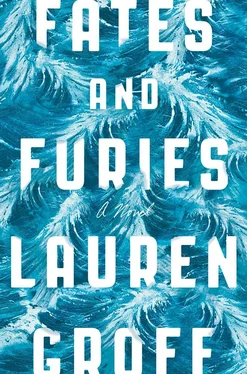“I can’t,” he said. “I’m sorry.”
“You are sorry,” she said.
“You’re just so pretty,” he said. “And I’m so lonely.”
She sat down heavily on the edge of the bed. There was a jungle scene on the comforter.
“Can I put my head in your lap?” he said.
“If you have to,” she said. He lowered his cheek to her thighs. She braced herself against the weight of his head. His hair was soft and smelled of unscented soap, and from this vantage, his skin was very sweet, pink and smooth like a piglet’s.
“My wife passed away,” he said, his mouth tickling her leg. “Six months ago. Breast cancer.”
“My husband died four months ago,” she said. “Aneurysm.” Pause. “I win,” she said.
His eyelashes brushed her skin while he thought about this. “So you know?” he said.
“I do,” she said.
The flick of the traffic light across the street from the motel filled the room with red and dark and red and dark. “How do you live?” she said.
“Ladies with casseroles. My kids call me every day. I’ve taken up kite building. It’s all so stupid,” he said.
“I don’t have kids,” she said.
“I’m sorry,” he said.
“Not me. Best decision I ever made,” she said.
“How do you live?” he said.
“By fucking the brains out of disgusting men.”
“Hey!” he said, then laughed. “How’s that working out for you?”
“Awful.”
“Then why do you do it?”
Slowly, she said: “My husband was the second man I’d had sex with. I was faithful for twenty-four years. I want to know what I was missing.”
“What were you missing?” he said.
“Nothing. Men are all absolutely terrible at sex. Except for my husband.”
She thought: Well, there had been one or two surprises, but mostly that was true.
He picked his moon face up off her lap. Pink dent on her thigh, moisture. He looked at her hopefully. “I’ve been told I’m an excellent lover,” he said.
She pulled her dress on over her head and zipped her boots to her knees. “Missed your window there, buddy,” she said.
“Oh, come on,” he said. “I’ll be quick.”
“Christ almighty,” she said, and put her hand on the doorknob.
His voice went bitter when he said, “Have a good time being a whore.”
“You poor sad little man,” she said, and went out without turning around.
—
THERE WAS NOTHING Mathilde could do. Flickering images hurt her head; books left her hollow. She was so tired of the old way of telling stories, all those too-worn narrative paths, the familiar plot thickets, the fat social novels. She needed something messier, something sharper, something like a bomb going off.
She drank a great deal of wine and fell asleep, and when she woke, it was in the middle of the night to a cold bed empty of her husband. That was when she knew, with existential bitterness, that her husband had understood nothing of her.
Somehow, despite her politics and smarts, she had become a wife, and wives, as we all know, are invisible. The midnight elves of marriage. The house in the country, the apartment in the city, the taxes, the dog, all were her concern: he had no idea what she did with her time. It would have been compounded with children; thank goodness for childlessness, then. There was also this: for a number of his plays, at least half, she would silently steal in at night and refine what he had written. [Not rewrite; edit, burnish, make glow.] And she ran the business side of his work; she had horrified visions of all the money he would have let evaporate in his goodwill and indolence.
Once, during the previews of The House in the Grove , when, it felt, they were on the brink of a flop, she had been in the office of the theater. Deep afternoon, rain and coffee. She had been reaming out a script supervisor with such softly vicious skill that the poor boy’s knees went out from under him and he had to sit on a crimson ottoman to gather himself. When she finished, she said, “You are dismissed.”
The boy stood and fled.
She hadn’t seen Lotto in the shadows of the hallway, glooming there.
“So,” he said. “When directors ask members of the cast to come see you, I gather it’s not for a pep talk. I had always thought it was for a pep talk. Magic cookie bars and café au lait, a nice little cry on your bosom.”
“Some people just need a different kind of motivation,” she said. She stood and stretched her neck, one side, the other.
“If I hadn’t seen it,” he said, “I wouldn’t have believed it.”
“Would you like me to stop?” she said. She wouldn’t. They’d be in the poorhouse. But she could keep it quieter, make sure he wouldn’t know.
He stepped in and locked the door behind him. “In truth, it turned me on,” he said. He came close and said, “I see her indeed in the image of a Valkyrie maiden, riding her steed into the circle, amid thunder and lightning, and out again, bearing the body of some dead hero across her saddle.” He picked her up and wrapped her legs around his hips, and turned, and pressed her back against the door.
Was he quoting? She didn’t care. His voice was full of admiration. She closed her eyes. “Giddyap, steed,” she said. He nickered in her ear.
She had a self she didn’t devote to him. For one thing, she wrote, and not just invisibly in his manuscripts, which he must have thought magically tidied themselves up in the night. She wrote her own things that she kept to herself: surreptitious, sharp objects part story, part poetry. Published under a pseudonym. She’d begun in despair when she was almost forty and he’d fallen and broken himself, and in the break, she felt him moving away from her.
There was the other thing, the far worse thing. During the same time she began to write, she left him. He was wrapped up in his work. She came back and he never knew she was gone.
—
SHE’D SEEN THE ARTISTS’ COLONY when she dropped Lotto off: they brought you lunch in wicker baskets and gave you your own stone cottage, with these long laughing conversations at night over candlelight. It had seemed a version of heaven. She’d held his face as she moved over him on the small and squeaky bed, but he’d turned her over, and when he shivered and gasped and put his head on her back to catch his breath, she felt a chill. She laughed off the premonition and drove away. For a few weeks, she’d be left alone in the tiny country house with God.
At first, she was sanguine. Her poor husband had had such a bad summer. There had been that spill down the airplane stairs, half of his body broken. He’d drunk too much, worked too little on his new play, been so very sad not to be at his high pitch of activity for so many months with all of the workshops and productions and business. And though she had been happy to have him to attend to in the house with her, to love him with her cupcakes and iced tea and bathing and many tiny kindnesses, she was glad when she took him for his birthday to the Podunk little opera house among the cow fields and watched his face as he sat forward, as he drank it all up. The tears shimmering in his eyes. She watched the contrails at intermission as a woman slunk up to greet him, blushing under the heat of his celebrity. Lotto, body broken, his expression so light, so ecstatic. It had been so long since all his faculties had been engaged.
So she had been fine to drop him off that gray November, to take a few weeks off from the constant care of him. He would be working with a young composer on an opera. Leo Sen.
But even the first week without Lotto, her life, her house, had been so empty. She forgot meals, ate dinners of tuna still in the can, spent too much time streaming films in bed. Time clicked by. The days grew colder, darker. Some days she never turned on the light, waking at eight when the sun rose weakly, sleeping at four-thirty when it bled itself out. She felt ursine. Norwegian. Her husband’s calls trickled down from once a day to every few days. In her half sleep, she had fiery nightmares of Lotto telling her he no longer needed her, he was leaving, he loved another woman. In her fever, she imagined some poetess, frail and young, with heifer hips molded for birthing, a girl who was respected in her own rights as an artist, which Mathilde would never be. He would divorce Mathilde, and he and his new whispery paramour would live in the apartment in the city in a glut of sex and parties and babies, endless babies, all with his face in miniature. She imagined the poetess almost into existence. She was so lonely she could choke on it. She called and called, and he never answered the telephone. His calls decreased even more; he called once the last week. He didn’t try to get kinky with her, which was so strange for Lotto that he could have been neutered.
Читать дальше












